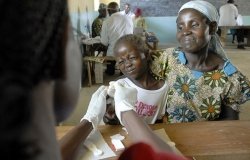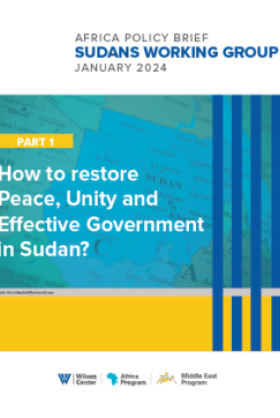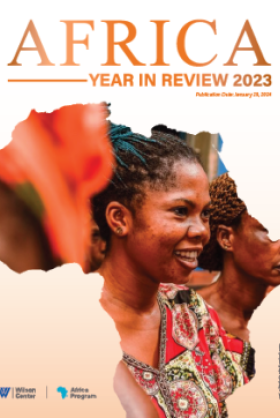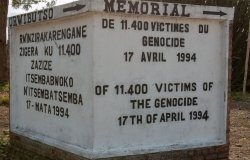Producing Informality in a Post-Apartheid Township
Theodore Powers, one of the 2008 Africanist Doctoral Fellows at the Africa Program of the Woodrow Wilson International Center for Scholars, presents his doctoral research project on August 14th, 2008. His dissertation is titled Producing Informality in a Post-Apartheid Township, and represents an investigation into the relationship between HIV/AIDS, social development and informal urban settlements in South Africa.
Overview
On Tuesday, August 14, 2008, Theodore Powers, a 2008 Africanist Doctoral Fellow of the Africa Program of the Woodrow Wilson Center for International Scholars, presented his doctoral research project entitled Producing Informality in a Post-Apartheid Township: an investigation into the relationship between HIV/AIDS, social development, and informal urban settlements in South Africa. The event was moderated by Steve McDonald, Consulting Program Manager for the Africa Program.
An integral part of his research included twelve months of residential research in South Africa, during which Powers conducted on-site interviews with inhabitants of informal settlements, especially in Khayelitsha, a community on the Western Cape, and with representatives of both non-governmental and governmental organizations that affect public policy and health in the country. An underlying theme of Powers' presentation was the difficulty of implementing HIV/AIDS policy at the local level. Powers quoted a community activist of Khayelitsha during an interview, "Politics here is somehow distant from getting involved with the HIV issues. That is the challenge you are sitting with." Key organizations provide inconsistent coordination with the state and local groups, and a significant disconnect is evident. Powers is inquiring through his research why informal settlements have a higher predominance of HIV/AIDS than wealthier areas of the country, and what problems are faced both nationally and locally in addressing and dealing with these inequalities.
Based on sheer numbers, South Africa can be defined as the epicenter of AIDS. Out of an estimated 38.6 million people infected world wide, about 5.5 million currently live in South Africa. In South Africa, 18.8 percent of the adult population is infected. There is a very uneven distribution between whites and blacks, black South Africans being seven percent more likely to be infected than white South Africans. In addition, only twenty-one percent of South Africans in need of aid are actually receiving it. Powers pointed out a demographic correlation that resurfaces partly from information he received at the National Aids Council in Pretoria. Apartheid created an historic foundation of affluent, predominantly white neighborhoods that can access the best of health services whereas informal settlements remain far behind, seriously hindered by the inability of city and the community to coordinate HIV/AIDS policy effectively. Informal townships and settlements are disproportionately inhabited by black South Africans with little educational background and enormous unemployment rates, and the growth of these settlements has only continued in the post-Apartheid era.
Informal settlements originated with the migrant labor system that served the mining industry. Powers referenced a quote from the American social commentator and scholar of urbanization, Mike Davis, who clearly identified these settlements as "key geopolitical spaces," particularly in South Africa. Labor compounds that began to expand in the first half of the 20th Century exploded onto the scene as the Apartheid legal system forcefully took hold and legally separated races groups. Additionally, in 1948, in an attempt to control the movement of black South Africans, the government introduced the "influx control policy," a successful campaign to segregate and move blacks out of major cities. Impoverishment and other economic disparities have encouraged the trend of urbanization. Official unemployment levels are around 23 percent, with informal estimations falling between fifty-eight and seventy-two percent. There is significant internal movement associated with townships, which Powers identifies as a predictor of HIV/AIDS rates. According to Powers' findings, population migration has a direct relationship with HIV/AIDS infection rates, and moving four or more times (within a settlement or to another part of the country) is a strong predictor of heightened HIV prevalence.
A public health crisis is looming for South Africans and their government. Clinics in informal settlements often open at 4 or 5AM, yet treatment is not universally available or accessible. A community activist Powers interviewed in Khayelitsha said, "They wait months to be put to treatment…They take hours to be tested, just tested." The brain drain phenomenon has cost South Africa many critical doctors and nurses who have relocated to Britain, the United States, and other Westernized countries, creating a pronounced debilitating impact on public health. The privatization of water, electricity, and other basic amenities has augmented informal settlement development, which Powers acknowledges to have a correlation to a rise in HIV/AIDS rates. Twenty percent of South Africans live in informal settlements, where HIV prevalence is at 21 percent, versus a 12 percent prevalence in formal settlements. In Khayelitsha, there is an average of 105 people to every one toilet seat. This is a very serious health crisis which touches an important percentage of the population. The recent reauthorization of PEPFAR, the American-led President's Emergency Plan for AIDS Relief, has created a positive sense of accomplishment, but one cannot step back and marvel at this progress without recognizing the challenges that still lie ahead. South Africa, in its second decade of democracy, has not been able to fully implement PEPFAR on the local level. A myriad of other efforts to address the HIV/AIDS epidemic have also not succeeded in creating a well integrated national system that addresses problems on both a local and national level.
Powers expressed concern over the local implementation of HIV/AIDS assistance in a country that is experiencing local level divisions in civic and government organizations, including the African National Congress. After numerous interviews, Powers noted a general feeling of disjuncture between aid provided to city regions driven by national level organizations and that which is provided to sub-city regions and irregular township settlements. Powers noted two organizations of particular importance to policy implementation: the South African National Civil Organization (SANCO) and the Treatment Action Campaign (TAC). SANCO is a formalization of street committees that coalesced in and drove the anti-apartheid movement. It has about 6.3 million members and works closely with the African National Congress, leveraging new actors to play the role of intermediary between the ANC and South African citizens. TAC is pushing for pharmaceutical companies to lower drug prices and to triple the treatment of AIDS, and have the objective of cutting the number of infections in half by 2011. Because President Mbeki and his ministers have been known to question the scientific link between HIV and AIDS, there has been a divergence of opinion between TAC and the government. Because SANCO is funded and supported by the government, funding for TAC has become an issue. Powers took this information and examined the spatial development and distribution of businesses, churches, clinics and other community services in townships and their relation to funding organizations, like SANCO and found that development and services are often placed in areas reflect loyalty to the ANC.
Powers major conclusions were that the disempowerment of local communities has undercut service delivery in dealing with HIV/AIDS and that balanced and even social development is essential to addressing HIV/AIDS.
Several subjects were raised during the question and answer session, including the impact Powers feels women have on HIV/AIDS advocacy and their role in local struggles for access to health care and representation on a national level. Powers concurred with the questioner that a strong role by women has been played, as they continue to be primary caregivers. Women have undertaken grassroots initiatives to empower local people and communities and it is now a question of how to go forth and support their attempts with resources and the necessary funding.
Powers will continue his studies as a PhD candidate in Cultural Anthropology as a Graduate Fellow at the Center for Place, Culture and Politics at the CUNY Graduate Center for the 2008-09 academic year working with David Harvey under the theme "Place and Politics.
Drafted by Molly Wilkins, Intern, and Justine Lindemann, Program Assistant.
Hosted By

Africa Program
The Africa Program works to address the most critical issues facing Africa and US-Africa relations, build mutually beneficial US-Africa relations, and enhance knowledge and understanding about Africa in the United States. The Program achieves its mission through in-depth research and analyses, public discussion, working groups, and briefings that bring together policymakers, practitioners, and subject matter experts to analyze and offer practical options for tackling key challenges in Africa and in US-Africa relations. Read more
Thank you for your interest in this event. Please send any feedback or questions to our Events staff.










